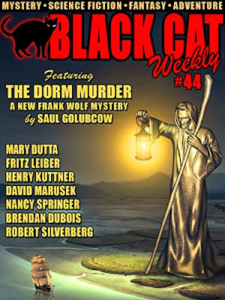by Paula Gail Benson
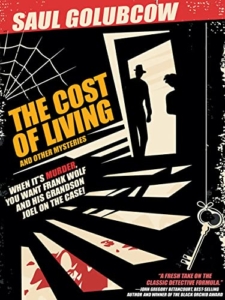
Last Monday, I introduced you to Saul Golubcow, whose Frank Wolf and Joel Gordon mysteries have just been compiled in The Cost of Living and Other Mysteries, available through Amazon and the publisher Wildside Press. As I mentioned in last week’s post, I’ve enjoyed reading each new story and been bold enough to ask Saul for more! I think you’ll find his characters and situations so intriguing it’s difficult to put a story down until the end. Saul’s been gracious enough to answer some questions about his life and how he found his way to writing fiction.
Thank you, Saul, for agreeing to be with us.
If you haven’t already been reading his work, now is a great time to start!
(1) What made you decide to write fiction?
Hard question as it suggests a definable or rational causality. But here goes. I think when I was much younger, feeling inside a pulse and rhythm of the English language and resonating viscerally to so much of what I read, I thought perhaps I could bring forth life through a fictional rendering. And perhaps I thought if others can do it, why can’t I? But in the same way I try to present Joel in my stories, I was immature not so much from an impulsive or know-it-all perspective, but rather as Joni Mitchell may have put it, I couldn’t see “both sides now.” It took decades of growing up to feel comfortable with myself writing fiction. Writing non-fiction opinion pieces demands much less in its two-dimensional approach to a subject. But I realized if I wanted to really depict Holocaust survivors, I had to devise a multi-dimensional way which could only be done through a fictional world of relationships, tensions, nobility, hypocrisy, loss, and vindication. I thought I was finally ready to create lives.
(2) How did you create the characters of Frank Wolf and his grandson Joel Gordon?
An easier question. As I mention in the “Acknowledgments” section, for one of my drawer-kept projected stories, I thought about the life and personality of my father-in-law. He had lost his first family during the Holocaust, and he arrived in the United States in later middle age following the Hungarian Revolution. He was well versed in religious practice, history, arts, the sciences, and the technologies of his time. I was also struck by his various observations of the human condition. Although he never attempted private detective work, he often spoke of “critical analyses” as an imperative for reining in impulsive and rash decision-making, the core skill of a good detective. I back then wondered, might I create a Holocaust survivor character who becomes a private detective in Brooklyn?
But also, Frank Wolf represents that spirit of Holocaust survivors that has insisted that while they suffered horrible victimization, they would not succumb to victimhood. Even before I met my father-in-law, this response to suffering was bred in my bones. I also saw it in my own family. My parents also lost whole families in the Holocaust. Grateful for the opportunity to make a living as poultry farmers in South Jersey even though they knew nothing of farming, nor later of being hotel managers in Atlantic City, they demonstrated a resilience in the midst of enduring pain, building a new life in which my sister and I were protected and a path into our future developed. My father often insisted, “I can’t give up.” These traits are infused into my Holocaust survivors’ characters, regardless of their individual and differing personalities.
As for Joel, I think my wife and I are the models for his character. Young, sometimes over-confident, sometimes self-doubting, sometimes respectful, sometimes imperious, we wrestled with our “Frank Wolf” and learned a good deal about love, trust, and respect as we did so.
(3) Tell us a little about Frank’s background, which is unique. How did you develop it?
As mentioned above, I took my father-in-law’s real-life background as the blueprint for Frank Wolf’s character. Before the War, though not a university professor, he was well educated in both secular and religious studies. He may have become a professor or a Rabbi or both had he, as the eldest male in the family, not been forced to take over the family business after the early death of his father. Frank Wolf before the Holocaust was the easiest task for me. The challenge was conceptualizing his life after, and seeing him as a private detective the way I present it in the stories seemed the right way to go.
(4) How do you determine the length of a story? What length do you feel most comfortable writing?
Intriguing question. When I am in short story conceptualization mode, I must deal with the constraints of forums accepting just so many words. So I go into “less is more” mode, and that’s ok for that particular genre. But as it occurred for me with “The Cost of Living” which was originally published as a short story, I wanted to say so much more about Frank’s background and life story that turned it into novella length. I gave myself the same leeway with the other stories (especially “The Dorm Murder”) because I wanted the reader to understand so much more about psyche, feeling, and crime solving method that I couldn’t advance in a word limited short story. I am comfortable novella length, but it’s possible my next mystery will be even longer.
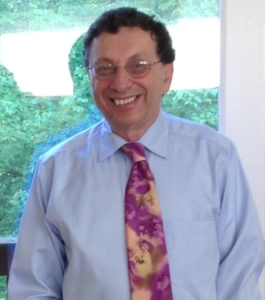
Saul Golubcow
Saul’s Bio:
When he is not immersed in the New York of the 1970s with his detective Frank Wolf, Saul Golubcow lives in Potomac, Maryland with his wife, Hedy Teglasi. His Jewish themed fiction centers on the complexity of and challenges Holocaust survivors in the United States have faced. His stories have appeared in Mystery Magazine, Black Cat Weekly, and Jewish Fiction.Net. The Cost of Living and Other Mysteries is his first book-length publication featuring Frank Wolf, a Holocaust survivor. In addition, his commentary on American Jewish culture and politics appear in various publications.

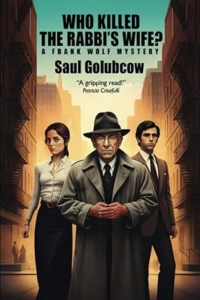 Saul Golubcow’s The Cost of Living and Other Mysteries contains three novellas with protagonist Frank Wolf, a Holocaust survivor turned private detective in 1970s New York City. Frank’s grandson Joel has been his chief assistant. Saul’s first novel, Who Killed the Rabbi’s Wife?, which be released on November 1, 2024, provides a larger canvas for Frank and Joel to conduct their investigations as well as introducing Joel’s wife Aliya, who happens to be a life-long friend of the victim’s daughter. I’m grateful to have been one of Saul’s advance readers. I highly recommend all his work.
Saul Golubcow’s The Cost of Living and Other Mysteries contains three novellas with protagonist Frank Wolf, a Holocaust survivor turned private detective in 1970s New York City. Frank’s grandson Joel has been his chief assistant. Saul’s first novel, Who Killed the Rabbi’s Wife?, which be released on November 1, 2024, provides a larger canvas for Frank and Joel to conduct their investigations as well as introducing Joel’s wife Aliya, who happens to be a life-long friend of the victim’s daughter. I’m grateful to have been one of Saul’s advance readers. I highly recommend all his work. is available for pre-order and will be released November 8, 2024. The anthology is inspired by the Music of Aerosmith, a rock and roll icon for fifty years that has announced it will no longer tour. This anthology is edited by Michael Bracken and features stories by the following sixteen crime fiction authors, Ed Ridgley, Bill Baber, Eve Fisher. Avram Lavinsky, John C. Bruening, Jeffrey Marks, Mary Dutta, Tom Mead, Steve Liskow, Joseph S. Walker, Adam Meyer, John M. Floyd, Leone Ciporin, M.E. Proctor, Tom Milani and Jim Winter. With all these extraordinary writers, this anthology is a must read.
is available for pre-order and will be released November 8, 2024. The anthology is inspired by the Music of Aerosmith, a rock and roll icon for fifty years that has announced it will no longer tour. This anthology is edited by Michael Bracken and features stories by the following sixteen crime fiction authors, Ed Ridgley, Bill Baber, Eve Fisher. Avram Lavinsky, John C. Bruening, Jeffrey Marks, Mary Dutta, Tom Mead, Steve Liskow, Joseph S. Walker, Adam Meyer, John M. Floyd, Leone Ciporin, M.E. Proctor, Tom Milani and Jim Winter. With all these extraordinary writers, this anthology is a must read.


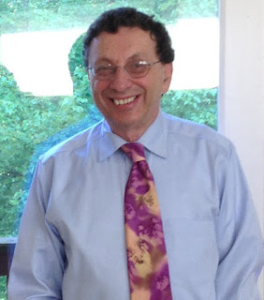 Frank Wolf, survived the Holocaust with his daughter and resettled from Vienna, Austria, to New York City. In his earlier life, Frank was a scholar, but proof of his academic background was destroyed by Nazis. Unable to pursue a career as a professor, Frank became a security guard for a library. Then, eventually, he set up an office as a private detective.
Frank Wolf, survived the Holocaust with his daughter and resettled from Vienna, Austria, to New York City. In his earlier life, Frank was a scholar, but proof of his academic background was destroyed by Nazis. Unable to pursue a career as a professor, Frank became a security guard for a library. Then, eventually, he set up an office as a private detective.